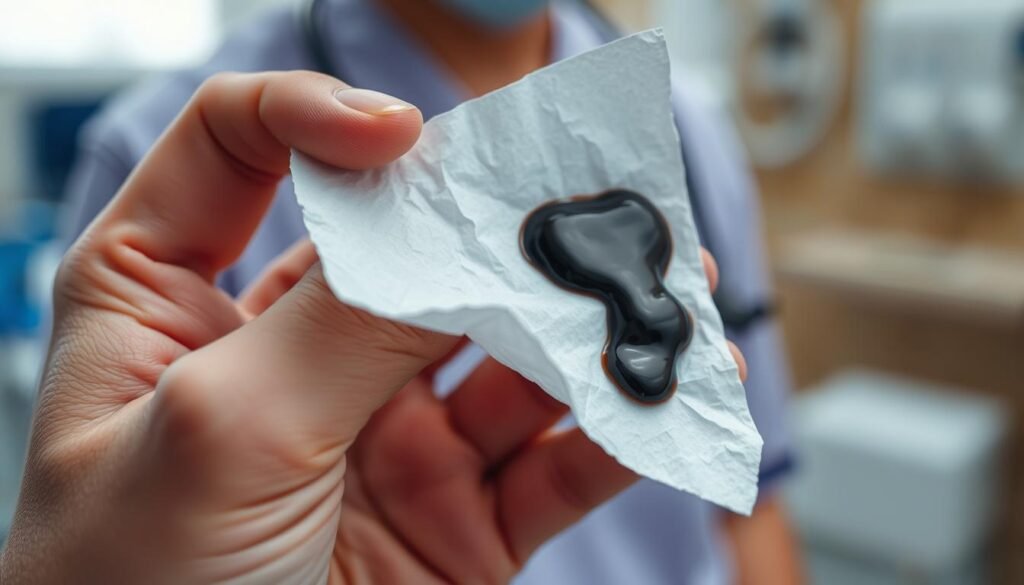Did you know more than 12,000 people are part of MyLungCancerTeam, a community for those battling lung cancer? This big number shows how lung cancer affects many and stresses the need to recognize signs like lung cancer black phlegm. Black mucus might signal severe lung problems, including cancer, urging us to be watchful and seek medical help quickly.
It’s key to understand how coughing up black mucus links to symptoms of lung cancer. This can be due to environmental factors, smoking, or infections. Seeing black phlegm means you should get expert medical advice right away. It could be a hint of serious health issues needing urgent care.
Key Takeaways
- Over 12,000 members on MyLungCancerTeam highlight the widespread concern regarding lung cancer.
- Black phlegm can indicate serious health issues, including lung cancer and infections.
- Smoking and environmental factors contribute significantly to the appearance of black mucus.
- Timely medical assessment is vital when experiencing symptoms like black phlegm.
- Understanding the significance of black mucus can lead to better health outcomes.
Introduction to Lung Health
Lung health is key for feeling good overall. The lungs are our main organ for breathing. They get oxygen to our whole body and get rid of carbon dioxide. It’s important to keep them working well for all physical activities and everyday life.
Different things can hurt our lungs, like bad air and harmful stuff around us. Pollution, smoking, and some jobs can be harmful. So, knowing how to take care of our lungs is very important. It helps us stay away from these risks and keep our respiratory system healthy.
We shouldn’t skip regular doctor visits and knowing about lung problems. These help with finding and dealing with health issues early. Being aware lets us choose better for our health. This way, we can look after our lungs better.
What is Black Phlegm?
Black phlegm is a type of mucus that is dark in color and comes from the lungs. Knowing what phlegm means helps us see how it’s different from regular mucus. It is thicker and stickier, often linked to breathing problems. Regular mucus, on the other hand, is found in the nose and plays a different role.
The color of mucus can tell us a lot about lung health. Black phlegm often means there are pollutants or irritants affecting the lungs. This dark color can come from things like air pollution, smoke, or infections.
Seeing black phlegm can be scary for most people. It’s key to know what might cause it so you can take care of your lungs. Issues like lung cancer, tuberculosis, pneumonia, or fungal infections can make your phlegm turn black. Knowing this helps people make better choices for their health and get the right medical help when needed.
Causes of Black Phlegm
Causes of black phlegm link to harmful environment or health habits. Smoking is a main cause. It can lead to lung problems. The tar in smoke turns mucus black. Smokers need to be aware of this as a health warning.
Being around pollutants, like coal dust or chemicals, also creates black phlegm. These particles harm the lungs. This makes breathing issues worse. It’s important to know about the air you breathe to keep lungs healthy.
Infections can make mucus turn black. This shows there might be a serious lung problem. Knowing these signs is key to getting help. For those with lung disease, it’s crucial to tell COPD and lung cancer apart. Quick medical care can make a big difference.
Common Symptoms of Lung Cancer
Lung cancer signs might not be obvious at first. Catching it early is key to better outcomes. Everyone should keep an eye out for signs that don’t go away or seem serious.
Be alert for symptoms like:
- Persistent cough: A cough that sticks around and doesn’t get better.
- Coughing up blood: This might look like bright red or rust-colored spit.
- Shortness of breath: Feeling out of breath easily, even after little activity.
- Chest pain: Pain that gets worse when you breathe deeply.
- Unexplained fatigue: Feeling unusually tired for no clear reason.
- Loss of appetite and weight loss: Eating less and losing weight without trying.
- Recurrent infections: Getting sick with bronchitis or pneumonia over and over.
Other signs include new wheezing, bone pain, and changes like headaches or weakness. There may be yellowing of the skin or eyes and swollen lymph nodes. Horner syndrome is another sign, with symptoms like a dropping eyelid.
If you notice any of these signs, it’s important to see a doctor quickly. Getting diagnosed early can open up better treatment chances. This might help improve life for those affected.
Lung Cancer Black Phlegm: Understanding Its Significance
Black phlegm could signal lung damage or serious stages of lung cancer. It often appears with a persistent cough. Studies show 65% of lung cancer patients cough at diagnosis. For advanced stages, this goes up to 80%, showing how symptoms reflect health.
If a cough lasts more than eight weeks, it may point to lung cancer. The importance of symptoms is clear, but most chronic coughs aren’t cancer. Coughing rarely means lung cancer, being less than 2% of cases.
Seeing black phlegm means you should talk to a doctor. It could be advanced lung cancer or another serious issue. Early action improves treatment success. Knowing about black phlegm and cancer helps get treatment soon. That’s why checking health changes is key.
Other Possible Causes of Coughing Up Black Mucus
Coughing up black mucus can come from different causes, not just lung cancer. It’s important to know these possible reasons. This is especially true because smoking and air pollution impact health.
Impact of Smoking on Lung Health
Smoking affects mucus by changing its color and texture. Tar and other harmful contents in smoke make the mucus darker as the body tries to clean them out. Smokers often see symptoms like coughing up black mucus. This highlights the dangers of smoking and how it harms the lungs.
Effects of Air Pollution on Mucus Color
Air pollution is another big risk for the lungs. It brings dangerous particles into the lungs, causing inflammation and darker mucus. People in polluted areas may cough up black mucus. Knowing about air quality and taking steps to protect yourself, like using masks or air filters, is key.

| Cause | Effects on Mucus |
|---|---|
| Smoking | Causes darkened, thickened mucus; increases risk of smoking-related lung diseases. |
| Air Pollution | Introduces harmful particles; triggers changes in mucus color resulting in coughing up black mucus. |
| Infections | Might lead to discoloration; can produce black mucus indicative of serious health issues. |
Infections Linked with Black Phlegm
Mucus is key in protecting our breathing system. Yet, when it turns black, it could mean health problems. Tuberculosis is a major cause linked with black phlegm. It comes with a long-term cough and severe symptoms that need quick doctor visits. If someone with tuberculosis has black mucus, it shows their condition is getting worse.
Fungal infections are another reason for black mucus. They are more common in people with weaker immune systems. Those battling HIV, undergoing cancer treatments, or managing diabetes are at higher risk. These infections can make breathing problems worse and are dangerous for people with lung issues.
Illnesses like COPD, bronchitis, or lung cancer can make these infections harder to handle. It increases how much mucus is made. Knowing the signs, like black phlegm, helps in treating it better. Learning about sputum cultures and tests helps find what the infection is and how to treat it.
Seeing black phlegm means you should see a doctor fast. This is particularly true if you also have fever, find it hard to breathe, or have chest pain. Diseases like tuberculosis and fungal infections linked with black mucus show why it’s key to watch your health and see a doctor early.
When to Seek Medical Attention
Seeing black phlegm might worry you about your lungs. It’s key to know when to see a doctor for certain symptoms. Some symptoms could be serious, urging you to get help fast.
Be alert if you notice these signs:
- Chest pain that gets worse when you cough or breathe
- Feeling short of breath or having trouble breathing
- A cough that keeps getting worse over time
- Spitting up blood or red phlegm
- Swelling in your face, arms, or neck
- Having headaches or feeling dizzy
Black mucus might point to something like lung cancer, so don’t ignore these symptoms. If they come on quickly or get a lot worse, it’s critical to get emergency care.
Here is a table that shows which symptoms mean you should get help right away:
| Symptom | Action Needed |
|---|---|
| Chest Pain | Seek immediate medical help |
| Difficulty Breathing | Visit the emergency room |
| Persistent Cough | Schedule an appointment with a doctor |
| Coughing up Blood | Call emergency services |
| Swelling of Face/Arms/Neck | Consult a healthcare provider right away |
Taking care of your lungs early can make treatment more successful. Not seeing a doctor could make things much worse. If you see any worrying signs, make sure to seek medical attention without delay.

How Is Black Phlegm Diagnosed?
Doctors start by checking your lung health to diagnose black phlegm. They look at your medical history, current symptoms, and if you’ve been around harmful stuff. It’s important to understand what your symptoms mean for a correct diagnosis.
Imaging tests like X-rays or CT scans are key. They let doctors see inside your lungs. This is how they find any problems that might cause black mucus. If diseases like pneumonia or tuberculosis might be the issue, more tests might be done.
Some special cases, like melanoma or contact with toxic substances, get extra attention. Dark mucus can signal serious health issues. That’s why it’s crucial to tell doctors about any changes. This helps in finding the right treatment for black phlegm and keeping your lungs healthy.
Treatment Options for Black Phlegm and Underlying Causes
Treating black phlegm means using different ways to deal with symptoms and causes. Knowing the right treatment is key to handle it well. There are many options like medical treatments, changes in how you live, and home cures.
Medicines are important in easing black phlegm symptoms. Antibiotics can be used for infections that cause more mucus. Over-the-counter meds, like expectorants, help make mucus thinner so it’s easier to get out. Inhalers or corticosteroids may be used for lung disease to lessen airway swelling.
Making changes in your lifestyle can improve your lungs. Stopping smoking is very important. Smoking causes a lot of black phlegm and lung issues. It’s crucial to avoid smoke and secondhand smoke too. Exercising regularly helps keep your lungs working well.
Home methods also help with black phlegm. Drinking more water makes mucus easier to cough up. Breathing in steam helps calm the airways and clears mucus. Herbal teas, like those with ginger or turmeric, may reduce swelling.
| Treatment Option | Type | Effectiveness |
|---|---|---|
| Antibiotics | Medications | Effective for infection-related black phlegm |
| Expectorants | Over-the-counter | Helps in thinning mucus |
| Inhalers/Corticosteroids | Medications | Reduces airway inflammation |
| Smoking Cessation Programs | Lifestyle Change | Highly effective for long-term lung health |
| Hydration | Home Remedy | Simplifies mucus expulsion |
| Steam Inhalation | Home Remedy | Relieves respiratory discomfort |

It’s vital to be proactive about lung health to avoid black phlegm problems. Using meds, changing your lifestyle, and trying home remedies can improve health. It’s important to notice symptoms early and start the right treatment for a better life.
Conclusion
Knowing about black phlegm is key. It helps spot signs of serious conditions, even lung cancer. Educating oneself on lung health and watching for changes in how we breathe is important. This awareness can lead to early help from doctors, which might save lives.
Being proactive about respiratory health can lower the risk of lung cancers. It’s important to keep an eye on symptoms and live healthily. Getting regular check-ups and understanding symptoms, like those of primary pulmonary malignant melanoma, is vital. This boosts health awareness.
The path to better lung health begins with recognizing warning signs. It highlights the need for health awareness. Everyone should be informed and watchful of symptoms. This helps create a support system for maintaining healthy lungs over time.